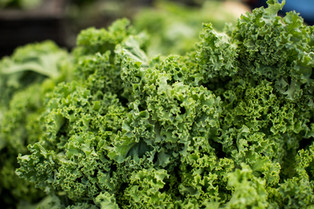5 Seasonal Foods With Amazing Effects On Inflammation
- Margreta

- Jun 17, 2020
- 3 min read
I’ll admit, there is nothing better in my opinion than eating seasonal foods, especially those straight from my backyard. I have three fruit and vegetable gardens plus more edible plants in pots.
This year I’m growing cucumbers, yellow squash, 3 types of beans, 4 types of tomatoes, 3 varieties of bell peppers, lemongrass, basil, rosemary, lavender, several varieties of lettuce and kale, beets, radish, and some other salad greens. I had several end of season salad greens overwinter and grew this spring but I don’t remember what they are! Plus my blueberry, strawberry, and elderberry plants I planted my first spring in the house (10+ years ago).
One of the reasons I grow so much of my own food in the summer is because eating in-season foods means I can get the food when it is perfectly ripe, fully ripened on the plant or vine. Not only does the food taste that much better it means the food is more nutritious than when it's picked before ripening and being shipped from South America, Canada, the midwest, or west coasts. There are studies to back this, not just my intuition!
Check out this 2008 study on the nutritional value in broccoli when grown in the spring or the fall and in case you're wondering, yes broccoli when grown in the fall (it’s normal growing season) was more nutritious than when grown in the spring using ripening agents to speed its development. I’m sure it's shocking to find out that food when left to grow naturally is healthier than when we as humans force it to grow earlier with chemicals...

Here are my top 5 seasonal foods to eat early summer:
Blueberries - ICYMI in this article, blueberries are full of beneficial antioxidants like vitamin C and vitamin K, they’re also a great source of fiber and manganese. A 1-cup serving of blueberries will give you about 4 grams of fiber...that gets you roughly 13% closer to your daily goal of fiber (assuming your goal is to eat around 30 grams of fiber). Antioxidants are important in reducing inflammation naturally.
Chard - My personal favorite is rainbow chard, but it comes in many varieties and is a member of the spinach and beet family of vegetables. Don’t just eat the leaves though, eat the pretty colored stalks - that’s where a lot of the nutrients and fiber are hiding. A 1-cup serving of cooked chard provides more than 200% of your daily vitamin A needs, more than 700% of Vitamin K, 22% Iron, nearly 4 grams of fiber, and just over 3 grams of protein! Vitamin K is a powerful anti-inflammatory helping to reduce cytokines which can cause inflammation.
Cherries - Which is your favorite...sweet or tart? I love tart cherries and just about any other tart fruit! Cherries are great sources of antioxidants and anti-inflammatory nutrients like vitamin C and polyphenols, which may help lower inflammation and reduce cellular damage. They’re also a good source of fiber, roughly 3 grams per 1-cup serving...are you noticing a trend yet? All these awesome foods are also high in...Fiber!
Kale - Considered a superfood by many nutritionists and food bloggers, but is it really all that good for you? Yes. Granted sometimes you have to eat an absurd amount to get the benefits that are sometimes associated with kale at the end of the day the average American diet is sorely lacking in...you got it, FIBER. Guess what kale has a good amount of? FIBER! Nearly 3 grams to be exact in 1 cup cooked kale. It’s also one of the best sources of vitamin K plus three nutrients that protect the eyes: beta carotene, lutein, and other antioxidants. The number one reason why I support calling kale a superfood is that it's nutritionally dense and filling. The bulk it adds to your meals leaves you feeling fuller longer.
Red Raspberries - Red raspberries are an amazing source of fiber, 8 grams in a 1-cup serving...more than a quarter of your daily needs! They also pack a powerful punch of about 50% of your daily vitamin C requirements. Vitamin C is the most recognizable antioxidant which may help to reduce inflammation and reduce the effects of cellular damage. The fiber in red raspberries is excellent for gut health. They’re also a low carbohydrate food which means they don’t raise blood sugar dramatically.
.png)













Comments